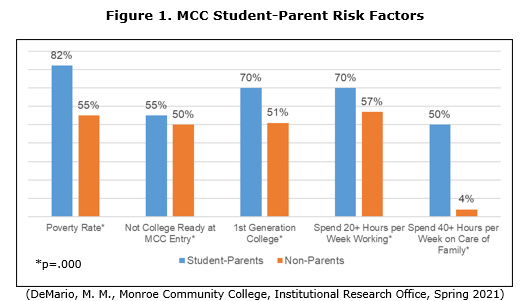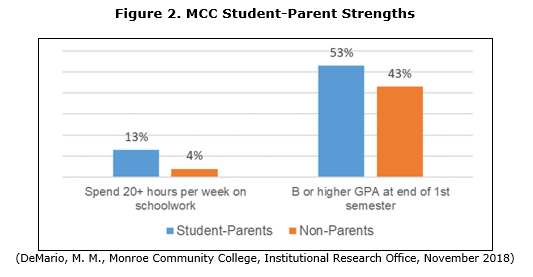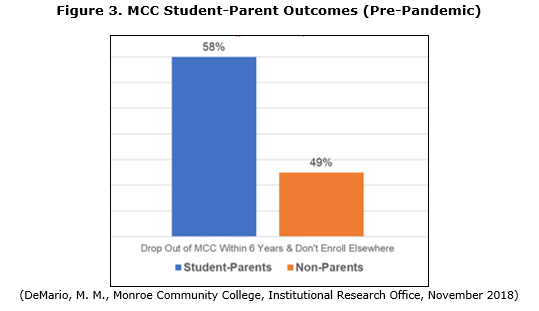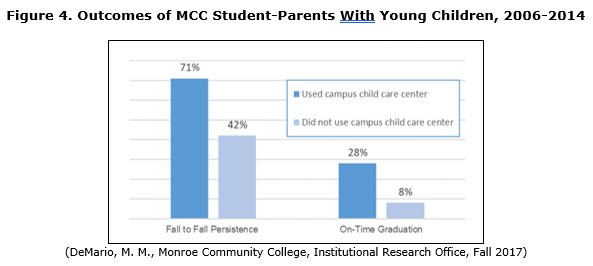Supporting One of Our Most At-Risk Populations: Student-Parents
College students who are parents, a.k.a., student-parents, have always been enrolled in community colleges, but only within the past few years have they been explicitly recognized as a distinct student group with a unique set of support needs. According to the Institute for Women’s Policy Research (2018), more than one in five postsecondary students in the U.S. is a student-parent. This holds true at Monroe Community College (MCC), where 21.4 percent of students enrolled in 2019-2020 had children under age 18 (DeMario, 2021).
Student-Parent Risk Factors
Figure 1 shows that MCC’s student-parents are disproportionally living in poverty, not college ready when they enter MCC (i.e., required to take high school-level courses before they can take college-level courses), and first-generation college students compared to our non-parents (DeMario, 2021). In addition, before the COVID-19 pandemic, 70 percent of MCC’s student-parents worked 20 or more hours per week, with half reporting spending 40 or more hours a week taking care of their families (DeMario, 2021). The resulting phenomenon is called “time poverty”: the lack of available time that student-parents can spend studying and completing coursework (Wladis et al., 2018). During the pandemic, many student-parents cared for their families 24 hours a day while they and their school-aged children attended school online and younger children, who would typically receive child care elsewhere, were also at home.
Student-Parent Strengths
Figure 2 shows that, despite struggling with time poverty, MCC’s student-parents still manage to eke out more time to study and do homework than our non-parents. Additionally, at the end of their first MCC semester, the college’s student-parents earn higher grades, on average, than its non-parents (DeMario, 2018).
Student-Parent Outcomes
Despite working hard and investing what little spare time they have in their coursework, it doesn’t take much for life to get in the way of student-parents’ education. A flat tire, an unexpected bill, or a breakdown in child care arrangements can disrupt their progress. The outcome is that more than half of MCC’s student-parents drop out within six years of starting, and they don’t enroll at other colleges (DeMario, 2018). The forces that can derail a student-parent’s education are inherent in their status as parents who are college students. Time poverty, financial poverty, intergenerational poverty, first-generation college student status, the inability to take college-level courses right out of the gate—these all overlap and play a part in student-parents’ heightened risk of dropping out.
Low-income families have been disproportionately hit by COVID-19. Nationwide, 60 percent of households with children under the age of 18 have lost their jobs, been furloughed, or had their earnings decrease because of the pandemic (Harvard T.H. Chan School of Public Health, 2020). Nearly half the jobs lost during the pandemic may be gone forever (Boak & Swanson, 2020). Among college students, more student-parents than non-parents considered dropping out in the past six months (Harvard T.H. Chan School of Public Health, 2020). The reason? The time and energy that could be devoted to school has been taken up in large part by their caregiving responsibilities (Rothwell, 2021). However, there are proven ways of helping student-parents to get back on track toward achieving their postsecondary goals. One of the biggest reasons student-parents struggle to stay enrolled in postsecondary institutions is a lack of reliable child care (Contreras-Mendez & Reichlin Cruse, 2021). Offering campus-based child care is one way community colleges can help student-parents to persist and graduate.
If You Can Measure It, You Can Manage It
Every semester MCC collects data on its students’ marital and parental status and the ages of their children. In 2014, the author conducted a study to assess the outcomes of MCC’s student-parents with young children who used our campus child care center vs. those who did not. The ones who used the center persisted from one fall semester to the next and graduated on time at a higher rate, as indicated in Figure 4 (DeMario, 2017).
The majority of the student-parents who use MCC’s Guon Child Care Center can do so because they receive a subsidy to pay their child’s tuition. Of the student-parents who receive a subsidy for the center and completed a recent survey, 100 percent said they would not be able to enroll or persist at MCC without a subsidy. This is further evidence that student-parents have a particular set of needs that do not apply to non-parents. If we as colleges can give student-parents the tools they need, we can make a college education more realistic for them.
Similar resources, such as before- and after-school programs, child care resource and referral agencies, and community-based organizations, can help as well, particularly for student-parents who have school-age children. For instance, MCC partners with the local nonprofit Child Care Council to better support students with children under the age of 18.
Next Steps
Student-parents—and the parents in our communities who want to attend college but need guidance on how to do so—aren’t looking for handouts. But they do need us to provide supports that put them on equal ground with non-parenting students, thus giving them a greater chance for success.
The student-parent movement in the U.S. is taking on increased importance during and after the pandemic because it touches issues of equity, enrollment, and budgets. Our nation’s greatest resource is our people power—and our policies can either block or unlock the full potential of our neighbors and community members. When we create the conditions that invite children to learn and allow adults to apply their skills, we tap into the hidden human potential all around us to make it through—and beyond—this pandemic. By recognizing our student-parents (including prospective student-parents in our communities), valuing them, and being intentional in our use of resources, many of which already exist, we can support multiple generations of people across the nation at a time when they need it the most.
References
Boak, J., & Swanson, E. (2020, July 24). AP-NORC poll: Nearly half say job lost to virus won’t return. https://apnews.com/article/virus-outbreak-ap-top-news-health-politics-lifestyle-ba6ea32e7a5ee4b79c7aed945e4d25b7
Contreras Mendez, S., & Reichlin Cruse, L. (2021, March). Busy with purpose: Lessons for education and policy leaders from returning student parents. Institute for Women’s Policy Research. https://iwpr.org/iwpr-issues/student-parent-success-initiative/busy-with-purpose-lessons-for-education-and-policy-leaders-from-returning-student-parents
DeMario, M. M. (2017). Outcomes of Monroe Community College student parents who used the campus child care center vs. those who didn’t, fall 2006-fall 2014. Unpublished manuscript.
DeMario, M. M. (2018). MCC’s students who are parents: Their unique characteristics, and how and why we should help them succeed. Unpublished manuscript.
DeMario, M. M. (2021, March 1-4). Supporting our most at-risk population: The ROI of assisting student-parents [Conference presentation]. League for Innovation in the Community College Virtual Innovations Conference.
Harvard T.H. Chan School of Public Health. (2020, September). Poll: 61% of U.S. households with children report facing serious financial problems during the coronavirus outbreak. https://www.hsph.harvard.edu/news/press-releases/poll-61-of-u-s-households-with-children-report-facing-serious-financial-problems-during-the-coronavirus-outbreak
Institute for Women’s Policy Research. (2019). Parents in college by the numbers [Fact sheet]. https://iwpr.org/iwpr-issues/student-parent-success-initiative/parents-in-college-by-the-numbers
Rothwell, J. (2021, January 29) College student caregivers more likely to stop classes. Gallup. https://news.gallup.com/opinion/gallup/328970/college-student-caregivers-likely-stop-classes.aspx
Wladis, C., Hachey, A. C., & Conway, K. (2018). No time for college? An investigation of time poverty and parenthood, The Journal of Higher Education, 89(6), 807-831. https://doi.org/10.1080/00221546.2018.1442983
Mary Ann M. DeMario, Ph.D., is an Institutional Research Specialist at Monroe Community College in Rochester, New York.
Opinions expressed in Innovation Showcase are those of the author(s) and do not necessarily reflect those of the League for Innovation in the Community College.














